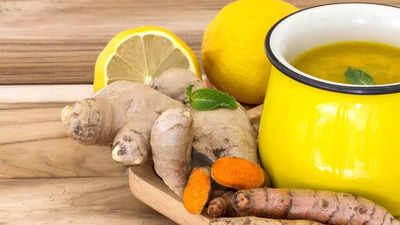Trending
Can diet reduce inflammation?8 Healthy foods that may fix inflammation
Inflammation is a natural body response to injury or infection, but chronic inflammation is linked to various health issues. Acute inflammation is temporary, while chronic inflammation lasts longer and can damage tissues. To reduce water retention, foods like cucumbers, watermelon, bananas, ginger, celery, parsley, and pineapple can help balance fluids and improve circulation.
Inflammation is the natural response of any form of injury, infection, or any other harmful stimuli in the body. It constitutes an integral part of the immune system's mechanism in protecting the body and promoting healing. However, chronic inflammation or uncontrolled one leads to different diseases and health complications. Different conditions like heart diseases, diabetes, arthritis, and even some cancers are linked with chronic inflammation.
Acute vs. Chronic Inflammation
Acute inflammation is temporary and comes as a response to immediate injury or infection. It can be seen when you sprain your ankle, get a cut, or suffer from a cold. In this case, the body works to heal the injury through increased blood flow into the afflicted area, leading to redness, swelling, and warmth. Normally, it would be advantageous, subsiding when the injury or infection clears.
Chronic inflammation, on the other hand, lasts longer—sometimes for years—and can occur without any evident outer cause. This type of inflammation is more problematic because it can cause damage to the body's tissues and organs. It has been associated with autoimmune diseases, where the immune system mistakenly attacks the body's healthy cells, as well as lifestyle-related conditions like obesity, smoking, and stress. Chronic inflammation leads to long-term health conditions, and it must be controlled through diet, exercise, and other healthy lifestyle choices to maintain overall health.

8 Healthy foods that may reduce water retention
Water retention, or edema, is the condition whereby there is an accumulation of excess fluid in the body's tissues, which causes swelling, bloating, and discomfort. It can be caused by various things, such as a shift in hormone levels, excessive salt intake, some types of medication, and inflammation. Luckily, some foods can help reduce water retention by balancing electrolytes and improving circulation. Here are 8 healthy foods to add to your diet to combat water retention:
Cucumbers
Cucumbers have a water content of about 96% and are replete with antioxidants. They act as a diuretic in nature to help flush excess fluids from the body and promote hydration, thus reducing bloating.
It can be added to salads, sandwiches, or even just snacking with a little lemon juice and salt is always refreshing. Another good way to keep hydrated and reduce bloating is to drink cucumber water.
Watermelon
Watermelon contains water and potassium, a mineral that regulates fluid balance in the body. It also worked as a natural kind of diuretic: increased urination gets rid of more fluid in the body.
Add watermelon to the diet as a snack, in smoothies, or add it to fruit salads. This is absolutely the most delicious, hydrating way to battle water retention when it's blazing outside.

Bananas
Bananas are an excellent source of potassium, a mineral that plays a key role in regulating fluid levels and reducing sodium buildup in the body. They help balance electrolytes, making them effective in reducing water retention.Bananas are an easy, anytime snack and can be added to smoothies, cereals, or oatmeal. They also pair well with peanut butter for a satisfying snack that can help keep water retention at bay.
Ginger
Ginger is well-known for its anti-inflammatory and digestive benefits. It also has natural diuretic properties that promote fluid elimination and reduce bloating. To add ginger to your diet in many forms: fresh ginger in smoothies or teas, ginger powder in cooking, or grated ginger in salads. A cup of ginger tea before meals can help improve digestion and reduce water retention.
Celery
Celery is not only hydrating but also acts as a natural diuretic. It contains a compound called phthalides, which promotes increased urination and the removal of excess fluid from the body. Add celery to salads, soups, or smoothies. Celery sticks also make a great low-calorie snack with hummus or peanut butter. You can also try fresh celery juice in the morning to kickstart hydration and reduce bloating.
Parsley
Parsley is an herb known for its natural diuretic effects. It helps increase urine production and promotes the elimination of excess water from the body. Moreover, parsley is rich in vitamin C and antioxidants that support overall health. Just sprinkle fresh parsley on salads, soups, or roasted vegetables. It also makes a great garnish for dishes like hummus, avocado toast, or even omelettes.
Pineapple
Pineapple contains bromelain, an enzyme that helps reduce inflammation and improves digestion. It also has a high water content, which helps flush out excess fluid from the body. Pineapple can be enjoyed fresh, in smoothies, or added to fruit salads. You can also try grilled pineapple as a delicious side or dessert, or add it to savory dishes like chicken or fish tacos for a tropical twist.
End of Article
FOLLOW US ON SOCIAL MEDIA
Visual Stories
Tired of too many ads?go ad free now




















